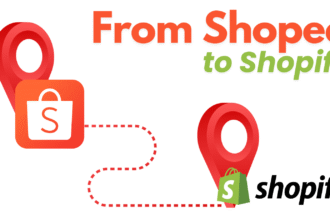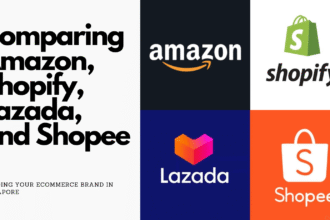Boost Your Shopify Store’s Local SEO in Singapore: Strategies for Success
You know how it is – this little red dot is buzzing with online shoppers, and getting your Shopify store seen by the right local crowd can feel like finding that perfect hawker stall.
Think of local SEO as your digital GPS, guiding those hungry-to-buy Singaporeans straight to your awesome products – especially those who are actively searching for what you’re selling. Whether they’re browsing on their phone or thinking of popping by a physical store (if you have one!), nailing local SEO means you’re on their radar.
Ever wondered how Google knows to show you that prata shop just around the corner? It’s all about how search engines process local searches. They’re like super-smart detectives using clues like where someone is searching from (IP address, GPS) to give them the most relevant results nearby. This whole process boils down to three main things:
- Relevance: Google’s basically trying to match your awesome store content with what people are typing in. So, using the right keywords on your site is key!
- Prominence: This is like your store’s reputation online. Think of it as how many people are talking about you through things like online directories, your Google My Business profile, and those precious customer reviews.
- Proximity: Simple as it sounds – how close are you to the person searching? Google takes this into account to show them the most convenient options.
To really boost these signals, make sure your Shopify store is listed in local online business directories (think Yellow Pages Singapore, Yelp Singapore, etc. – I’ve added some links below!). Keep your details consistent across all these platforms – it’s like having your store’s signboard looking the same everywhere online. And remember, just like our ever-evolving hawker scene, search engines are always changing. That’s why creating high-quality content that speaks directly to local interests and culture is super important to stay visible and ahead of the game.
Ready to dive in? Let’s makan!
Jump to:
- Why Local SEO is Your Secret Weapon for Shopify in Singapore
- Nailing Your Google My Business Setup for Singaporean Shoppers
- Spice Up Your Shopify Content with Local Keywords
- Getting Some Love: Building Local Backlinks
- Chit-Chat with Your Local Customers on Social Media
- Keeping Tabs: Monitoring Your Local SEO Performance
- Staying Ahead: Adapting to Singapore’s Local Search Trends
Why Local SEO is Your Secret Weapon for Shopify in Singapore
Alright, let’s get real. Local SEO isn’t just a fancy term; it’s a must-have in your arsenal if you’re selling to the Singaporean market.
Think of it this way: you might have the coolest products, but if the auntie down the street searching for them online can’t find you, it’s like having the best nasi lemak hidden in a back alley with no sign! Local SEO makes sure you pop up when those nearby customers are actively looking for what you offer.
While Shopify gives you the whole world as your oyster, focusing locally means you’re not just a face in the global crowd. You’re actively engaging with potential customers right here in Singapore. This is especially crucial if you’ve got a physical store or offer services within specific areas. By prioritizing local SEO, you’ll show up in those “near me” searches, connecting you with people who are more likely to buy because you’re convenient.
Here’s how to boost your local relevance:
- Sprinkle in those local keywords: Think about what Singaporeans would actually type when searching for your products. Include these in your product descriptions, page titles, meta descriptions, and even image file names.
- Get your Google My Business on point: This is like your online shopfront. Make sure it’s complete, accurate, and engaging (more on this below!).
- Earn those local brownie points (backlinks): Get other local websites to link to you – it tells Google you’re a trusted part of the community.
- Keep your NAP consistent: Make sure your Name, Address, and Phone number are exactly the same everywhere online – Google loves consistency!
By focusing on these areas, you’re not just being seen online; you’re connecting with your local community and turning those online searches into real sales.
Nailing Your Google My Business Setup for Singaporean Shoppers
Okay, listen up – your Google Business Profile (formerly Google My Business) is like your digital signboard in Singapore. It’s often the first thing potential customers see, so you gotta make it shine!
Here’s the step-by-step on how to get it set up right:
- Head over to the Google Business Profile website: You can find it right here: https://www.google.com/business/. Sign in with your Google account (the one you use for your business).
- Click ‘Manage Now’: Let’s get started!
- Enter your business name: Make sure it’s exactly how it appears on your store and any other official listings. Consistency is key!
- Tell Google what you are: If you have a physical shop, choose ‘Storefront’. If you serve customers in specific areas (like delivery or home services), pick ‘Service Area Business’ and define those areas clearly (think specific postal codes or neighbourhoods in Singapore).
- Pinpoint your location: Enter your exact business address. If you’re a service area business without a storefront, you can hide your address but still specify your service areas.
- Share your contact deets: Include your local Singaporean phone number and your Shopify store’s website URL. Double-check these for accuracy!
- Make it visually appealing: Upload high-quality photos of your storefront (if applicable), your awesome products, and your branding. Think bright, clear, and inviting!
- Craft a compelling description: Use relevant local keywords that Singaporeans might use to find you. Highlight what makes your store unique and what you offer. Keep it concise and engaging!
- Verify your listing: Google will give you a few ways to verify your business (usually by postcard, phone, or email). Follow their instructions carefully to complete this crucial step.
Pro Tip for Ongoing Engagement: Don’t just set it and forget it! Regularly update your profile with posts about promotions, special events (think National Day sales!), new arrivals, and even helpful tips related to your products. This keeps your profile fresh and shows Google (and your customers) you’re active!
Spice Up Your Shopify Content with Local Keywords
Think of keywords as the secret ingredients that help Singaporean shoppers find your online store. You need to sprinkle them strategically throughout your Shopify content!
Here’s your recipe for local keyword success:
- Do your homework (keyword research): Use tools like Google Keyword Planner (https://ads.google.com/intl/en_sg/home/tools/keyword-planner/) to see what phrases locals are actually searching for. Think beyond just “buy dresses online” and consider “dress shops near me in Tiong Bahru” or “best local snacks Singapore delivery.”
- Integrate naturally: Once you have your list of local keywords, weave them naturally into your:
- Page Titles: These are what show up in the browser tab and search results. Make them clear and include your main local keyword.
- Meta Descriptions: This is the short snippet of text under your title in search results. Make it enticing and include relevant local keywords to encourage clicks.
- Product Descriptions: Be detailed and use local terms where appropriate. Imagine you’re describing a Peranakan-inspired product – use terms that resonate with that local culture.
- Headings (H1, H2, etc.): Use headings to break up your text and incorporate relevant local keywords.
- Speak the local lingo: Don’t be afraid to use local terms and even some Singlish where it fits your brand’s tone! This helps you connect with your Singaporean audience on a more personal level. Just don’t overdo it and make it sound unnatural.
- Create local love with blog posts: This is where you can really shine! Write blog posts about local events, news relevant to your industry in Singapore, or even guides related to your products and how they fit into the local context. For example, if you sell picnic supplies, you could write a blog post about the “Best Picnic Spots in Singapore.”
- Don’t forget your visuals: Use location-based keywords in the alt text of your images (the description you add for accessibility) and even in your image file names. This gives search engines more context about your local relevance.
- Keep it fresh: Regularly update your content to reflect seasonal trends, local happenings, and changes in what your customers are searching for. This keeps your store relevant and valuable.
Remember: It’s all about finding that sweet spot – using enough relevant local keywords to get noticed without sounding like a keyword-stuffing rojak!
Getting Some Love: Building Local Backlinks
Think of backlinks as online shout-outs. When other reputable websites link to your Shopify store, it tells Google that your site is trustworthy and relevant. Local backlinks are especially powerful for boosting your local SEO.
Here’s how to get those valuable local shout-outs:
- Connect with the local community: Identify local blogs, news websites, and industry-specific directories in Singapore. See if they have opportunities for guest blogging where you can share your expertise and naturally link back to your store.
- Partner up with local businesses: Think about businesses that complement yours but don’t directly compete. Could you collaborate on a promotion or event? This can often lead to valuable backlinks from their websites.
- Sponsor local events or initiatives: If there are local events or charities you care about, consider sponsoring them. Often, sponsors get a link on the event website.
- Get listed in local online directories: Make sure your store is listed in relevant Singaporean online directories like:
- Yellow Pages Singapore
- Yelp Singapore
- Singapore Business Directory
- Streetdirectory.com.sg
- FourSquare
- Industry-specific directories relevant to what you sell. Ensure your NAP (Name, Address, Phone Number) is exactly the same on all these directories!
- Be a local expert: If there’s a local news story or blog post related to your industry, offer your expert opinion. This could lead to a backlink if they quote you.
Remember: Quality over quantity! A few high-quality backlinks from reputable local websites are much more valuable than tons of low-quality links. Focus on building genuine connections within the Singaporean online community.
Chit-Chat with Your Local Customers on Social Media
Social media isn’t just for sharing pretty pictures; it’s a powerful tool to connect with your local Singaporean audience on a personal level and boost your local SEO indirectly.
Here’s how to get social locally:
- Set up your profiles right: Make sure your Facebook, Instagram, TikTok (if relevant!), and other profiles include your store’s name, address (if you have a physical one), and website. Use relevant local keywords in your bio.
- Use geotags like a pro: When you post, always tag your location! This helps local users discover your content when they’re browsing nearby.
- Share locally relevant content: Talk about local events, news, or trends that your Singaporean audience cares about. If there’s a hawker festival happening nearby, or if you’re celebrating a local holiday, share it! This shows you’re part of the community.
- Engage, engage, engage! Respond to comments and messages from your local followers. Ask them questions, run local polls, and create content that encourages interaction. User-generated content (like customers sharing photos of their purchases) is gold!
- Target your local audience with ads: Platforms like Facebook and Instagram have powerful ad targeting options that let you reach people in specific geographic areas of Singapore. Use this to your advantage!
- Collaborate with local influencers: Partner with Singaporean influencers who have a strong following within your target audience. Their endorsements can boost your credibility and reach.
- Track your success: Use the analytics tools on each platform to see what kind of content resonates best with your local audience and adjust your strategy accordingly.
Think of social media as your virtual kopitiam – a place to connect, chat, and build relationships with your local customers.
Keeping Tabs: Monitoring Your Local SEO Performance
You wouldn’t plant a garden and never check if it’s growing, right? The same goes for your local SEO efforts! You need to monitor and analyze your performance to see what’s working and what needs tweaking.
Here are the tools and metrics you should be paying attention to:
- Google Analytics (https://analytics.google.com/): This is your go-to for understanding website traffic. Look at:
- Organic traffic: How many people are finding you through search engines?
- Location data: Are you seeing traffic from Singapore? Drill down to specific cities or regions if needed.
- User behavior: How long are local visitors staying on your site? What pages are they looking at? This can tell you if your content is relevant.
- Google Search Console (https://search.google.com/search-console/welcome): This helps you understand how your site is performing in Google search results. Keep an eye on:
- Search queries: What keywords are people using to find you? Are they local?
- Impressions and clicks: How often are you showing up in local searches, and how many people are clicking through to your site?
- Mobile usability: With so many Singaporeans using their phones, make sure your site is mobile-friendly!
- Google Business Profile Insights: This gives you valuable data about how people are interacting with your listing:
- Views: How many people are seeing your profile?
- Searches: How are people finding your profile (direct search, discovery search, branded search)?
- Actions: What are people doing (visiting your website, requesting directions, calling you)?
- Local Ranking Trackers (like BrightLocal (https://www.brightlocal.com/) or Moz Local (https://moz.com/local/overview)): These tools help you track where you rank in local search results for your target keywords. This can give you a good indication of how your optimization efforts are paying off.
Regularly reviewing these metrics will help you:
- Identify what keywords are driving local traffic.
- Understand how local customers are engaging with your store.
- Spot areas where you can improve your content or SEO strategy.
- Measure the success of your local SEO efforts over time.
Don’t just collect data – analyze it and take action! If you see a lot of local searches for a particular term that you’re not ranking well for, it might be time to create more content around that topic.
Staying Ahead: Adapting to Singapore’s Local Search Trends
Just like the latest bubble tea craze, local search trends are always evolving! To stay ahead of the game in Singapore, you need to be flexible and adapt your SEO strategy.
Here’s what’s hot in Singapore’s local search scene:
- Mobile-First is King (or Queen!): Singapore has a super high mobile penetration rate. If your Shopify store isn’t lightning-fast and mobile-friendly, you’re missing out big time! Google also prioritizes mobile-first indexing, meaning they primarily look at the mobile version of your site for ranking.
- Voice Search is Rising: More and more Singaporeans are using voice assistants like Siri and Google Assistant to find local businesses. Think about how people speak naturally and incorporate conversational keywords into your content. For example, instead of “best pizza delivery Singapore,” they might say, “Hey Google, where can I get pizza delivered near me?”
- Hyperlocal Targeting: People are increasingly looking for very specific local results (e.g., “best vegetarian restaurant in Joo Chiat”).
So there you have it, my fellow Singaporean e-commerce entrepreneurs!
Think of local SEO as nurturing your own little digital garden right here in the heart of Singapore’s online marketplace. You need to plant the right seeds (local keywords), tend to the soil (your website and Google Business Profile), and build strong trellises (local backlinks and social engagement) to help your store flourish.
Keep a close eye on your analytics – they’re like the weather forecast for your garden, telling you when to water more or adjust your approach. And remember, just like Singapore itself, the digital landscape is always evolving, so staying adaptable to the latest trends is key to long-term success.
Now, if all this talk of optimizing and developing your online presence feels a tad overwhelming, or if you’re looking to build a stunning, high-performing Shopify store that’s primed for local success from the get-go, then perhaps it’s time to call in the experts. We understand the nuances of the Singaporean e-commerce market and can help you lay a strong foundation for attracting those valuable local customers.
Ultimately, by focusing on these local SEO strategies, you’re not just aiming for more clicks; you’re building a stronger connection with your local audience, fostering trust, and cultivating long-term loyalty right here in Singapore.
Soodo
Soodo | Shopify Website Development






Leave a Reply